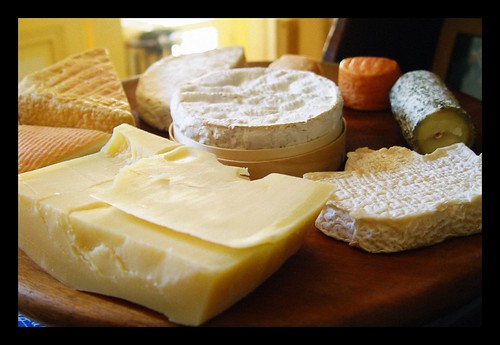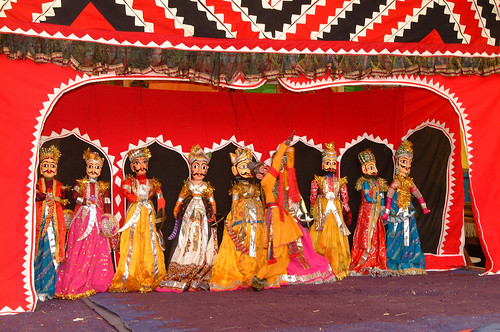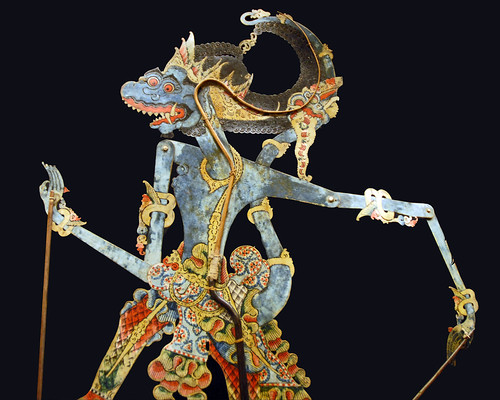Every week we watch tons of TV for weird and interesting words so you don’t have to. Here are our latest selections.

Delicious Cheese
affineur
Andrew Zimmern: “He’s also an affineur, a master in the art of aging cheese, a process that’s integral to the creation of world-class fromage.”
“Wisconsin,” Bizarre Foods America, March 11, 2013
Affineur, one responsible for aging cheese, is French in origin. Related is affine, “to refine (metal).”
bumper
Casteau: “Why the shit are you maggots not prepping!”
Archer: “Wait, are you doing a bumper?”
“Live and Let Dine,” Archer, February 28, 2013
A bumper is, in broadcasting, a pause between a television show and a commercial, often including voiceover and a dramatic clip from an upcoming segment. A bumper may also be a recurring theme music or an eyecatch, a recurring scene or illustration, often used in anime programs.
Changnesia
Dr. Kedan: “Changnesia is a fascinating and extremely rare disease on the forefront in psychological landscape.”
“Advanced Documentary Filmmaking,” Community, March 14, 2013
Changnesia is, according to Community, “the complete loss of memory caused by sudden trauma that was, itself, also forgotten.” It’s also known as “Kevin’s Disease” and comes from the Greek amnēsiā, “forgetfulness,” and the Chinese surname, Chang.
conclave
Samantha Bee: “Conclave is Latin for ‘with key.’ It describes the closed door meeting [to elect the new pope].”
The Daily Show with Jon Stewart, March 7, 2013
In addition to “the meeting held to elect a new pope,” conclave refers to a secret meeting in general, “the private rooms in which the cardinals meet to elect a new pope,” a private apartment, and “the body of cardinals.”
defenestrate
Mindy: “Sam was helping out around my apartment, and he was defenestrated.”
Danny: “You threw a soldier out a window?”
“The One That Got Away,” The Mindy Project, February 26, 2013
Defenestrate means to eject out of a window and is a back-formation of defenestration, which partly comes from the Latin fenestra, “window.”
electrocutioner
Louise: “I’m going to tell everyone the truth about Edison, the electrocutioner!”
“Topsy,” Bob’s Burgers, March 10, 2013
The word electrocutioner, “an executioner who uses electricity to kill the condemned person,” has been around at least since the late 19th century. (The earliest citation we found was from 1890.)
The Electrocutioner is also DC Comics character whose “costume possesses circuitry that allows him at will to either stun or kill his victims with a bolt of electricity.”
Gorn
Stephen Colbert [regarding President Obama’s mixing up Jedi mind trick and Vulcan mind meld]: “Do you even know what planet Yavin 4 is? That’s a trick question. It’s not a planet, it’s a moon. You are such a Gorn.”
The Colbert Report, March 4, 2013
A Gorn is a humanoid reptile from the Star Trek universe.
hooligan fish
Anthony Gastelum: “These are hooligans. These come from the Stikine River.”
Andrew Zimmern: “Hooligans are smelt, very rich in oil, preserved by smoking them.”
“Alaska,” Bizarre Foods America, March 11, 2013
The hooligan fish is also known as the eulachon or candlefish, a type of smelt rich in fat and oil. Eulachon-oil was “made to serve as a natural candle by inserting in it the pith of a rush or a strip of bark as a wick,” hence the name, candlefish.
Eulachon comes from Chinook jargon, “a pidgin trade language of the [U.S.] Pacific Northwest.” Hooligan is an alteration of eulachon. Other alterations include oolichan, oulachon, and uthlecan.
MacGuffin
Dean Martin: “Assisting in Kevin’s recovery has put a financial strain on the school. That’s why we are appealing to the MacGuffin Neurological Institute for this $40,000 grant, so we can continue to fight this terrible disease and hopefully one day pay for this documentary.”
“Advanced Documentary Filmmaking,” Community, March 14, 2013
A MacGuffin is “a plot element or other device used to catch the audience’s attention and maintain suspense, but whose exact nature has fairly little influence over the storyline.” The MacGuffin in this episode of Community seems to be the making of the documentary or the need for the grant money.
The first recorded usage of the word may been by Alfred Hitchcock in 1939.
snowquester
Stephen Colbert: “The word snowquester is a combination of the word snow and the sequester. I think this is fantastic and ridiculous. Or fantasticulous.”
The Colbert Report, March 6, 2013
Colbert suggests naming all weather events “after what kind they are plus whatever people are talking about on television at the time,” such as blizzardashian, a blend of blizzard and Kardashian, and drone-cicle, a blend of drone, a pilotless aircraft, and icicle.
subsistence living
Andrew Zimmern: “People like Anthony Gastelum, Ruth Demmert, and Steve Rose put a lot of time intro training a new generation in the art of subsistence living.”
“Alaska,” Bizarre Foods America, March 11, 2013
Subsistence living depends upon subsistence farming, “in which the farmers focus on growing enough food to feed themselves and their families.” In rural Alaska, subsistence living is often protected over “commercial or recreational fishing and gaming.”
Van de Graaff generator
Teddy: “In high school my buddies and I built a Van de Graaff generator. You know, to get girls.”
“Topsy,” Bob’s Burgers, March 10, 2013
A Van de Graaf generator is an electrostatic generator invented in 1929 by American physicist Robert J. Van de Graaf. Touching a Van de Graaf generator makes one’s hair stand on end, due to the machine’s “static-producing qualities.”
wilding
Al Madrigal: “Now if you guys [Puerto Rico] become a state, you’re not gonna have that parade anymore. . .Montana doesn’t have a parade.”
Woman: “If we don’t have the parade, I guess we have less wilding opportunities. [laughs manically] Because you know my peeps can go a little crazy sometimes.”
The Daily Show with Jon Stewart, March 6, 2013
Wilding is slang for “the act or practice of going about in a group threatening, robbing, or attacking others.”
The term was coined in the late 1980s, according to the Oxford English Dictionary, and made its first appearance in an April 22, 1989 article of The New York Times regarding the Central Park Jogger case: “Some of the 20 youths brought in for questioning had told investigators that the crime spree was the product of a pastime called ‘wilding’. ‘It’s not a term that we in the police had heard before,’ the chief said.”
[Photo: CC BY 2.0 by Chris Buecheler]




